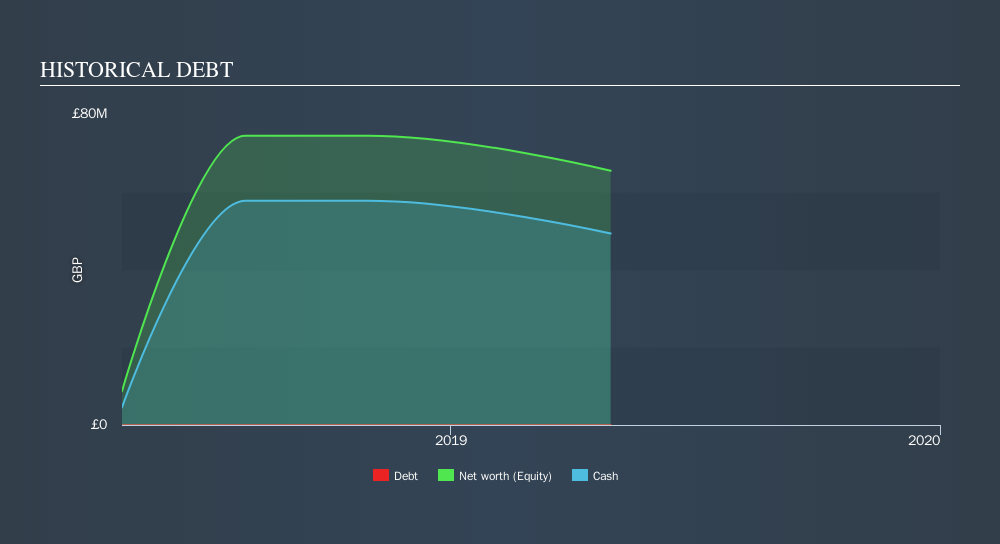- United Kingdom
- /
- Healthtech
- /
- AIM:SENS
Did You Manage To Avoid Sensyne Health's (LON:SENS) 45% Share Price Drop?

Passive investing in an index fund is a good way to ensure your own returns roughly match the overall market. When you buy individual stocks, you can make higher profits, but you also face the risk of under-performance. Investors in Sensyne Health plc (LON:SENS) have tasted that bitter downside in the last year, as the share price dropped 45%. That's disappointing when you consider the market returned 2.8%. Sensyne Health may have better days ahead, of course; we've only looked at a one year period. The falls have accelerated recently, with the share price down 34% in the last three months. This could be related to the recent financial results - you can catch up on the most recent data by reading our company report.
View our latest analysis for Sensyne Health
With just UK£136,000 worth of revenue in twelve months, we don't think the market considers Sensyne Health to have proven its business plan. This state of affairs suggests that venture capitalists won't provide funds on attractive terms. As a result, we think it's unlikely shareholders are paying much attention to current revenue, but rather speculating on growth in the years to come. It seems likely some shareholders believe that Sensyne Health will significantly advance the business plan before too long.
We think companies that have neither significant revenues nor profits are pretty high risk. There is almost always a chance they will need to raise more capital, and their progress - and share price - will dictate how dilutive that is to current holders. While some such companies do very well over the long term, others become hyped up by promoters before eventually falling back down to earth, and going bankrupt (or being recapitalized).
When it last reported its balance sheet in April 2019, Sensyne Health had cash in excess of all liabilities of UK£44m. While that's nothing to panic about, there is some possibility the company will raise more capital, especially if profits are not imminent. With the share price down 45% in the last year , it seems likely that the need for cash is weighing on investors' minds. The image below shows how Sensyne Health's balance sheet has changed over time; if you want to see the precise values, simply click on the image. Look at the image below to see how Sensyne Health's cash levels have changed over time.

Of course, the truth is that it is hard to value companies without much revenue or profit. Given that situation, would you be concerned if it turned out insiders were relentlessly selling stock? I'd like that just about as much as I like to drink milk and fruit juice mixed together. You can click here to see if there are insiders selling.
A Different Perspective
While Sensyne Health shareholders are down 45% for the year, the market itself is up 2.8%. However, keep in mind that even the best stocks will sometimes underperform the market over a twelve month period. The share price decline has continued throughout the most recent three months, down 34%, suggesting an absence of enthusiasm from investors. Basically, most investors should be wary of buying into a poor-performing stock, unless the business itself has clearly improved. Shareholders might want to examine this detailed historical graph of past earnings, revenue and cash flow.
If you are like me, then you will not want to miss this free list of growing companies that insiders are buying.
Please note, the market returns quoted in this article reflect the market weighted average returns of stocks that currently trade on GB exchanges.
We aim to bring you long-term focused research analysis driven by fundamental data. Note that our analysis may not factor in the latest price-sensitive company announcements or qualitative material.
If you spot an error that warrants correction, please contact the editor at editorial-team@simplywallst.com. This article by Simply Wall St is general in nature. It does not constitute a recommendation to buy or sell any stock, and does not take account of your objectives, or your financial situation. Simply Wall St has no position in the stocks mentioned. Thank you for reading.
About AIM:SENS
Sensyne Health
Sensyne Health plc, a healthcare technology company, develops software products that connects healthcare professionals with patients in the United Kingdom and the United States.
Flawless balance sheet and undervalued.
Market Insights
Community Narratives



